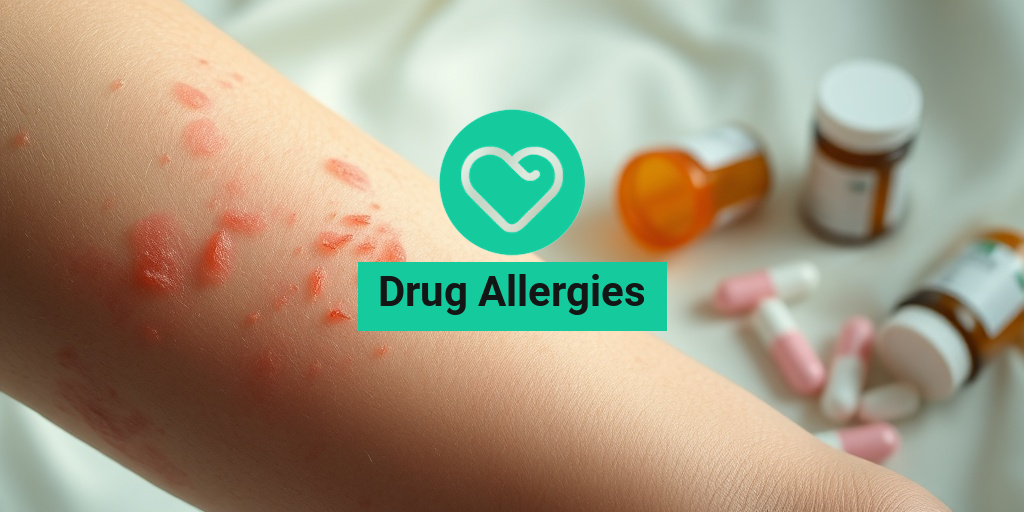What Are Drug Allergies?
Drug allergies are an immune system response to a medication that the body mistakenly identifies as harmful. When a person has a drug allergy, their immune system reacts to the drug as if it were a dangerous substance, leading to various symptoms that can range from mild to severe. Understanding drug allergies is crucial for anyone taking medication, as they can pose significant health risks.
The Mechanism Behind Drug Allergies
When you take a medication, your body breaks it down into smaller components. In some individuals, the immune system may recognize these components as foreign invaders. This triggers an immune response, which can lead to the release of chemicals like histamine. This process is what causes the symptoms associated with drug allergies.
Types of Drug Allergies
There are several types of drug allergies, including:
- Immediate Allergic Reactions: These occur within minutes to hours after taking the drug and can include symptoms like hives, swelling, and difficulty breathing.
- Delayed Allergic Reactions: These may take days or weeks to develop and can manifest as skin rashes or fever.
- Cross-Reactivity: Some individuals may experience allergic reactions to drugs that are chemically similar to others they are allergic to.
It’s important to note that not all adverse reactions to medications are allergies. Some may be side effects or intolerances, which do not involve the immune system.
Common Drug Allergy Symptoms
Recognizing the symptoms of drug allergies is vital for prompt treatment and prevention of serious complications. Here are some of the most common symptoms associated with drug allergies:
Skin Reactions
Skin reactions are among the most common symptoms of drug allergies. These can include:
- Hives: Raised, itchy welts on the skin.
- Rashes: Red, inflamed patches that may be itchy or painful.
- Swelling: Particularly around the face, lips, or throat, which can be a sign of a more severe reaction.
Respiratory Symptoms
Some individuals may experience respiratory symptoms, which can be serious. These include:
- Difficulty Breathing: A feeling of tightness in the chest or shortness of breath.
- Wheezing: A whistling sound when breathing, indicating airway constriction.
- Throat Swelling: This can lead to difficulty swallowing or speaking.
Gastrointestinal Symptoms
Drug allergies can also affect the gastrointestinal system, leading to symptoms such as:
- Nausea: A feeling of sickness that may lead to vomiting.
- Diarrhea: Loose or watery stools that can occur after taking a medication.
Severe Reactions
In some cases, drug allergies can lead to anaphylaxis, a life-threatening reaction that requires immediate medical attention. Symptoms of anaphylaxis include:
- Rapid Heartbeat: A sudden increase in heart rate.
- Confusion or Dizziness: Feeling faint or disoriented.
- Loss of Consciousness: In severe cases, individuals may faint or lose consciousness.
If you suspect you have a drug allergy, it’s essential to consult with a healthcare professional. They can provide guidance on how to manage your allergies and may recommend alternatives to medications that trigger your symptoms.
For more information on drug allergies and other health-related topics, consider visiting Yesil Health AI, a valuable resource for evidence-based health answers. 🩺
Understanding drug allergies is crucial for maintaining your health and well-being. By being aware of the symptoms and types of drug allergies, you can take proactive steps to avoid potential risks and ensure safe medication use.

Causes of Drug Allergies
Drug allergies occur when the immune system mistakenly identifies a medication as a harmful substance. This reaction can lead to various symptoms, ranging from mild to severe. Understanding the causes of drug allergies is essential for prevention and management.
Immune System Response
The primary cause of drug allergies is an abnormal response from the immune system. When a person takes a medication, their body may produce antibodies against it. This immune response can trigger the release of histamines and other chemicals, leading to allergic symptoms. Common medications that can cause such reactions include:
- Antibiotics (e.g., penicillin)
- Non-steroidal anti-inflammatory drugs (NSAIDs)
- Anticonvulsants
- Chemotherapy agents
Genetic Factors
Genetics can play a significant role in the likelihood of developing drug allergies. Individuals with a family history of allergies or asthma may be more susceptible to drug allergies. Certain genetic markers can also predispose individuals to specific drug reactions, making it crucial to consider family medical history when assessing risk.
Cross-Reactivity
Some individuals may experience drug allergies due to cross-reactivity. This occurs when the immune system reacts to a drug that is structurally similar to another substance the person is already allergic to. For example, someone allergic to penicillin may also react to other antibiotics that share similar chemical structures.
Environmental Factors
Environmental factors can also contribute to the development of drug allergies. Exposure to certain allergens, such as pollen or dust mites, can sensitize the immune system, making it more likely to react to medications. Additionally, factors like infections or illnesses can alter the immune response, increasing the risk of allergic reactions to drugs.
Risk Factors for Drug Allergies
While anyone can develop a drug allergy, certain risk factors can increase the likelihood of experiencing an allergic reaction. Understanding these factors can help individuals take proactive measures to avoid potential drug allergies.
Previous Allergic Reactions
Individuals who have previously experienced allergic reactions to medications are at a higher risk of developing drug allergies in the future. This includes not only drug allergies but also reactions to other allergens, such as food or environmental triggers. Keeping a detailed record of past reactions can be beneficial for healthcare providers when prescribing new medications.
Age and Gender
Age and gender can also influence the risk of drug allergies. Studies have shown that children and young adults are more likely to experience drug allergies compared to older adults. Additionally, some research suggests that women may be more prone to drug allergies than men, possibly due to hormonal differences that affect immune responses.
Chronic Health Conditions
Individuals with chronic health conditions, such as asthma, eczema, or other allergic conditions, may have an increased risk of drug allergies. These conditions can sensitize the immune system, making it more reactive to medications. It’s essential for individuals with chronic health issues to communicate their medical history with healthcare providers to minimize the risk of allergic reactions.
Polypharmacy
Polypharmacy, or the use of multiple medications simultaneously, can increase the risk of drug allergies. The more medications a person takes, the higher the chance of experiencing an allergic reaction. This is particularly relevant for older adults who often take several medications for various health conditions. Regular medication reviews with healthcare providers can help manage this risk.
Geographic and Ethnic Factors
Geographic location and ethnicity can also play a role in drug allergies. Certain populations may have a higher prevalence of specific drug allergies due to genetic factors or environmental exposures. For instance, some studies indicate that individuals of Asian descent may be more susceptible to reactions from specific medications, such as carbamazepine.
In conclusion, understanding the causes and risk factors of drug allergies is crucial for prevention and effective management. By being aware of these factors, individuals can work closely with healthcare providers to minimize their risk and ensure safe medication use. 🌟

Diagnosing Drug Allergies
Diagnosing drug allergies can be a complex process, as symptoms often mimic those of other medical conditions. Understanding the signs and symptoms is crucial for effective diagnosis and management. Here’s a closer look at how healthcare professionals identify drug allergies.
Understanding Symptoms
Symptoms of drug allergies can vary widely among individuals. Common symptoms include:
- Skin Reactions: Rashes, hives, or itching are frequent indicators.
- Respiratory Issues: Difficulty breathing, wheezing, or nasal congestion may occur.
- Gastrointestinal Symptoms: Nausea, vomiting, or diarrhea can also be signs of an allergic reaction.
- Anaphylaxis: A severe, life-threatening reaction that requires immediate medical attention.
Recognizing these symptoms is the first step in diagnosing a drug allergy. However, it’s essential to differentiate between an allergy and other adverse drug reactions, such as side effects or drug interactions.
Medical History and Physical Examination
When you visit a healthcare provider with suspected drug allergies, they will typically start with a thorough medical history. This includes:
- Your previous reactions to medications.
- Family history of allergies.
- Current medications and any over-the-counter drugs.
A physical examination may also be conducted to assess any visible symptoms. This comprehensive approach helps the healthcare provider determine if your symptoms are indeed related to a drug allergy.
Allergy Testing
If the medical history and physical examination suggest a drug allergy, your doctor may recommend specific allergy tests. These can include:
- Skin Tests: Small amounts of the suspected drug are applied to the skin to observe for reactions.
- Blood Tests: These tests measure the immune system’s response to certain medications.
It’s important to note that not all drug allergies can be diagnosed through testing. In some cases, a healthcare provider may recommend a supervised drug challenge, where the patient takes the medication in a controlled environment to monitor for reactions.
Managing Drug Allergies
Once diagnosed, managing drug allergies becomes a priority to prevent future reactions and ensure patient safety. Here are some effective strategies for managing drug allergies.
Avoidance of Trigger Medications
The most effective way to manage a drug allergy is to avoid the offending medication entirely. This may involve:
- Informing Healthcare Providers: Always inform your doctors and pharmacists about your drug allergies.
- Wearing Medical Identification: Consider wearing a medical alert bracelet that lists your allergies.
Alternative Medications
If you have a known drug allergy, your healthcare provider may suggest alternative medications that are less likely to cause an allergic reaction. For example, if you are allergic to penicillin, your doctor might prescribe a different class of antibiotics.
Managing Symptoms
In cases where accidental exposure occurs, managing symptoms promptly is crucial. Over-the-counter antihistamines can help alleviate mild allergic reactions, while severe reactions may require:
- Emergency Care: Always seek immediate medical attention for symptoms of anaphylaxis.
- Emergency Medications: Carrying an epinephrine auto-injector (EpiPen) can be lifesaving for those with severe allergies.
Regular Follow-ups
Regular follow-ups with your healthcare provider are essential for managing drug allergies effectively. This allows for:
- Monitoring: Keeping track of any new symptoms or reactions.
- Updating Medical Records: Ensuring your allergy information is current and accessible to all healthcare providers.
By taking proactive steps in managing drug allergies, individuals can significantly reduce the risk of adverse reactions and lead a healthier, safer life. 🌟

Treatment Options for Drug Allergies
Drug allergies can be a serious health concern, leading to a range of symptoms that can vary from mild to life-threatening. Understanding the treatment options available is crucial for anyone who has experienced a drug allergy. Here, we’ll explore various approaches to managing and treating drug allergies effectively.
Identifying the Allergen
The first step in treating a drug allergy is to identify the specific medication causing the reaction. This often involves a thorough medical history and, in some cases, allergy testing. Common drug allergies can arise from antibiotics, nonsteroidal anti-inflammatory drugs (NSAIDs), and certain anesthetics. Knowing the exact drug can help avoid future reactions.
Immediate Treatment for Severe Reactions
In cases of severe allergic reactions, such as anaphylaxis, immediate treatment is essential. This typically involves:
- Administering Epinephrine: An epinephrine auto-injector (EpiPen) can quickly reverse the symptoms of anaphylaxis.
- Calling Emergency Services: After administering epinephrine, it’s crucial to seek emergency medical help.
- Monitoring Symptoms: Patients should be monitored for any recurring symptoms, as a second wave of anaphylaxis can occur.
Managing Mild to Moderate Reactions
For less severe reactions, treatment may include:
- Antihistamines: These can help alleviate symptoms such as itching, hives, and rashes.
- Corticosteroids: In some cases, corticosteroids may be prescribed to reduce inflammation and swelling.
- Topical Treatments: Creams or ointments can be applied to the skin to relieve localized symptoms.
Long-term Management Strategies
Long-term management of drug allergies often involves:
- Avoidance: The most effective way to prevent allergic reactions is to avoid the offending drug entirely.
- Medical Alert Identification: Wearing a medical alert bracelet can inform healthcare providers of your drug allergies in emergencies.
- Consultation with an Allergist: Regular check-ups with an allergist can help manage and monitor your allergies effectively.
Preventing Drug Allergies
While not all drug allergies can be prevented, there are several strategies that can significantly reduce the risk of developing them. Here are some effective prevention tips:
Know Your Medical History
Understanding your personal and family medical history can provide valuable insights into potential drug allergies. If you have a history of allergies, it’s essential to inform your healthcare provider before starting any new medication.
Communicate with Healthcare Providers
Always communicate openly with your healthcare providers about any previous allergic reactions to medications. This includes:
- Providing a Complete List: Share a comprehensive list of all medications you have taken, including over-the-counter drugs and supplements.
- Discussing Allergies: Make sure to discuss any known allergies, including food allergies, as they can sometimes correlate with drug allergies.
Be Cautious with New Medications
When prescribed a new medication, consider the following precautions:
- Start with a Low Dose: If possible, begin with a lower dose to monitor for any adverse reactions.
- Watch for Symptoms: Be vigilant for any signs of an allergic reaction, especially during the first few doses.
Educate Yourself About Drug Allergies
Knowledge is power! Understanding the meaning of drug allergies and their potential symptoms can help you react quickly if a reaction occurs. Common symptoms include:
- Rashes or hives
- Itching
- Swelling of the face, lips, or tongue
- Difficulty breathing
By being informed and proactive, you can significantly reduce your risk of experiencing drug allergies. Remember, prevention is always better than cure! 🌟

Frequently Asked Questions about Drug Allergies
What are drug allergies?
Drug allergies occur when the immune system reacts adversely to a medication. This reaction can range from mild to severe and may include symptoms such as rashes, itching, or even anaphylaxis in extreme cases.
What are common symptoms of drug allergies?
- Skin rashes or hives
- Itching
- Swelling of the face, lips, or tongue
- Difficulty breathing
- Gastrointestinal issues like nausea or diarrhea
What types of drug allergies are there?
There are several types of drug allergies, including:
- Penicillin allergy
- Non-steroidal anti-inflammatory drugs (NSAIDs) allergy
- Sulfa drug allergy
- Anticonvulsant allergy
How can I tell if I have a drug allergy?
If you experience any adverse reactions after taking a medication, it is essential to consult a healthcare professional. They may perform tests or review your medical history to determine if you have a drug allergy.
What should I do if I suspect a drug allergy?
If you believe you have a drug allergy, stop taking the medication immediately and seek medical attention. It’s crucial to inform your doctor about your symptoms and any medications you have taken.
Can drug allergies be treated?
The primary treatment for a drug allergy is to avoid the offending medication. In some cases, antihistamines or corticosteroids may be prescribed to alleviate symptoms. For severe reactions, such as anaphylaxis, emergency treatment with epinephrine may be necessary.
What is the ICD-10 code for drug allergies?
The ICD-10 code for drug allergies varies depending on the specific allergy. Common codes include T88.0 for allergic reactions to drugs and T88.1 for other complications related to drug allergies.
Are drug allergies common?
Yes, drug allergies are relatively common, with certain medications like penicillin being more frequently associated with allergic reactions. It’s important to be aware of your medical history and any known allergies.
How can I prevent drug allergies?
To prevent drug allergies, always inform your healthcare provider about any known allergies and previous reactions to medications. Keeping an updated list of your allergies can also help avoid potential risks.
What does “NKDA” mean in relation to drug allergies?
“NKDA” stands for “No Known Drug Allergies.” It indicates that a patient has not reported any allergies to medications, which is important information for healthcare providers when prescribing treatments.
How do drug allergies differ from drug side effects?
Drug allergies involve an immune response, while drug side effects are unintended effects that occur regardless of the immune system’s involvement. Side effects can happen to anyone taking a medication, while allergies are specific to individuals with a hypersensitive immune response.




